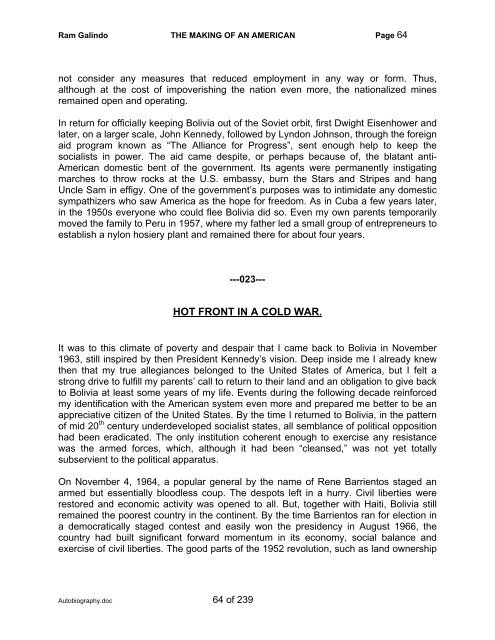Autobiography - The Galindo Group
Autobiography - The Galindo Group
Autobiography - The Galindo Group
Create successful ePaper yourself
Turn your PDF publications into a flip-book with our unique Google optimized e-Paper software.
Ram <strong>Galindo</strong> THE MAKING OF AN AMERICAN Page 64<br />
not consider any measures that reduced employment in any way or form. Thus,<br />
although at the cost of impoverishing the nation even more, the nationalized mines<br />
remained open and operating.<br />
In return for officially keeping Bolivia out of the Soviet orbit, first Dwight Eisenhower and<br />
later, on a larger scale, John Kennedy, followed by Lyndon Johnson, through the foreign<br />
aid program known as “<strong>The</strong> Alliance for Progress”, sent enough help to keep the<br />
socialists in power. <strong>The</strong> aid came despite, or perhaps because of, the blatant anti-<br />
American domestic bent of the government. Its agents were permanently instigating<br />
marches to throw rocks at the U.S. embassy, burn the Stars and Stripes and hang<br />
Uncle Sam in effigy. One of the government’s purposes was to intimidate any domestic<br />
sympathizers who saw America as the hope for freedom. As in Cuba a few years later,<br />
in the 1950s everyone who could flee Bolivia did so. Even my own parents temporarily<br />
moved the family to Peru in 1957, where my father led a small group of entrepreneurs to<br />
establish a nylon hosiery plant and remained there for about four years.<br />
---023---<br />
HOT FRONT IN A COLD WAR.<br />
It was to this climate of poverty and despair that I came back to Bolivia in November<br />
1963, still inspired by then President Kennedy’s vision. Deep inside me I already knew<br />
then that my true allegiances belonged to the United States of America, but I felt a<br />
strong drive to fulfill my parents’ call to return to their land and an obligation to give back<br />
to Bolivia at least some years of my life. Events during the following decade reinforced<br />
my identification with the American system even more and prepared me better to be an<br />
appreciative citizen of the United States. By the time I returned to Bolivia, in the pattern<br />
of mid 20 th century underdeveloped socialist states, all semblance of political opposition<br />
had been eradicated. <strong>The</strong> only institution coherent enough to exercise any resistance<br />
was the armed forces, which, although it had been “cleansed,” was not yet totally<br />
subservient to the political apparatus.<br />
On November 4, 1964, a popular general by the name of Rene Barrientos staged an<br />
armed but essentially bloodless coup. <strong>The</strong> despots left in a hurry. Civil liberties were<br />
restored and economic activity was opened to all. But, together with Haiti, Bolivia still<br />
remained the poorest country in the continent. By the time Barrientos ran for election in<br />
a democratically staged contest and easily won the presidency in August 1966, the<br />
country had built significant forward momentum in its economy, social balance and<br />
exercise of civil liberties. <strong>The</strong> good parts of the 1952 revolution, such as land ownership<br />
<strong>Autobiography</strong>.doc 64 of 239


